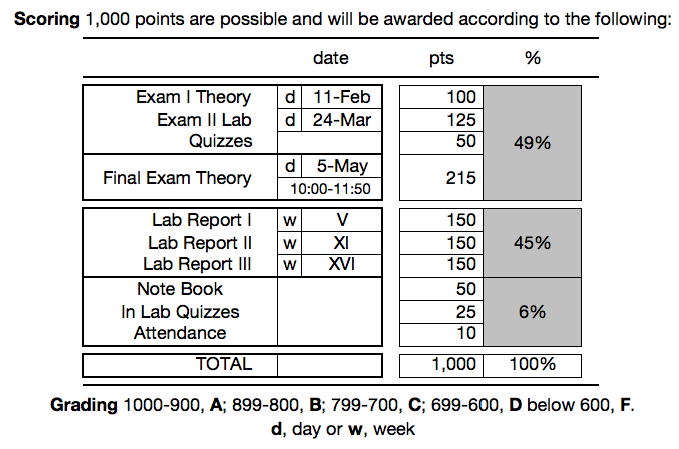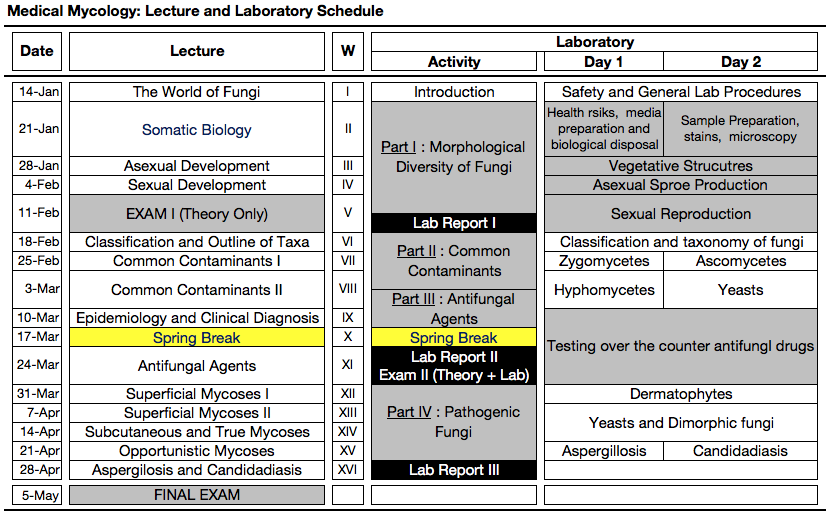
MICR 3143 Medical Mycology 3hrs
GoTo Lecture and Laboratory Notes
GoTo D2L
GoTo FINAL EXAM
Syllabus Spring 2016
Lecture Notes and other materials for the course are available from the Medical Mycology Site http://microbiology.okstate.edu/faculty/prade
Lectures: Thursday 12:30-01:20PM – LSE 215
Section 1: Lab Monday/Wednesday 10:00-11:50AM – LSE101
Section 2: Lab Tuesday/Thursday 10:00-11:50AM – LSE101
Instructor R A Prade LSE409 Tel 4 7522
Teaching Assistant Nick Kuburich, LSE401 Tel 4 7284
Office hours by appointment E-mail prade@okstate.edu or kuburic@ostatemail.okstate.edu
Objectives and Format This course has been designed to give students a unique opportunity to observe and explore the world of fungi and to be exposed to the many problems and modern issues related to the discomfort that fungi cause to humans. As you probably are aware, myco-infections are becoming alarmingly common in recent years and a great deal of attention is being given to fungal infections. Two modules contain the course: lectures (that will provide you with historical and contemporary background information) and laboratory experiments (that will allow you to observe and identify pathogenic fungi). The course was designed to attend the needs of undergraduate biology majors with emphasis in the medical field.
Recommended Textbooks
Theory Fundamental Medical Mycology 2011 Errol Reiss, H. Jean Shadomy, G. Marshall Lyon (Hardover ISBN: 978-0-470-17791-4, E-book ISBN: 978-1-1181-0175-9)
Laboratory Identifying Filamentous Fungi: A Clinical Laboratory Handbook St-Germain G and Summerbell R Rogers Star Publishing Company 1996 Belmont CA
Companion Websites: Mycology Online of the University of Adelaide (http://www.mycology.adelaide.edu.au/)
Additional Reading
– Introductory Mycology Alexopoulos CJ Mims CW Blackwell M Fourth Edition John Wiley & Sons Inc 1996 New York NY – Medical Mycology KJ Kwon-Chung and JE Bennett Lea & Febiger 1992 Philadelphia PA – Medical Microbiology A Laboratory Manual: Section II WG Wu Third Edition Star Publishing Company 1995 Belmont CA
Rules and Policies OSU rules and policies will be strictly enforced, specially regarding academic dishonesty/misconduct, special accommodations for students, retention & grading policies, class attendance and add & drop dates
Exam I-Theory The content of each exam is cumulative (covers all previously discussed topics). Additional reading (besides the recommended textbook) is strongly suggested. Exams will be designed based on the topic and not on a specific textbook.
Exam II–Laboratory Your laboratory skills will be tested in this exam.
Lab. Reports Three lab reports are scheduled to be turned in. The reports should contain a short description for each experiment done in the laboratory. For each experiment a Summary, Material and Methods, Results and Discussion section is required. Results can be reported in many different ways, however hand drawn figures and sketches from your microscopic observations are strongly recommended. All reports should be prepared individually.
Quizzes in lecture or laboratory classes are intended to assist you in determining your progress during the course.

Laboratory Work The laboratory work involves the execution of several experiments (see Lab Schedule). Lab coats, inoculation loops and markers are available at the Student Union Bookstore and should be purchased before the first day of laboratory work. Students may be divided into groups however all reports, quizzes and tests are individual. Many of the biological samples that will be provided to you need to be shared with others. Please always be careful while handling specimens and make sure to leave enough biological material for everybody. You will be responsible for all phases of an experiment, including preparation, observation, recording of results and safe disposal of cultures and specimens. The laboratory might be available for additional time, provided previous arrangements have been made.
Bio-Safety General laboratory safety procedures are expected to be known, understood, and strictly followed during all classes at all times. The Instructor and Teaching Assistant will give specific instructions and procedures regarding disposal of biohazard materials, and manipulation of pathogenic cultures to you. ALL SAFETY PROCEDURES ARE TO BE STRICTLY FOLLOWED.
Microscopes You are fully responsible and liable for all the materials and equipment’s assigned to you. Special attention needs to be given to microscopes. Please use these delicate instruments only as recommended. Microscopes are expensive and even minor repairs are costly.

